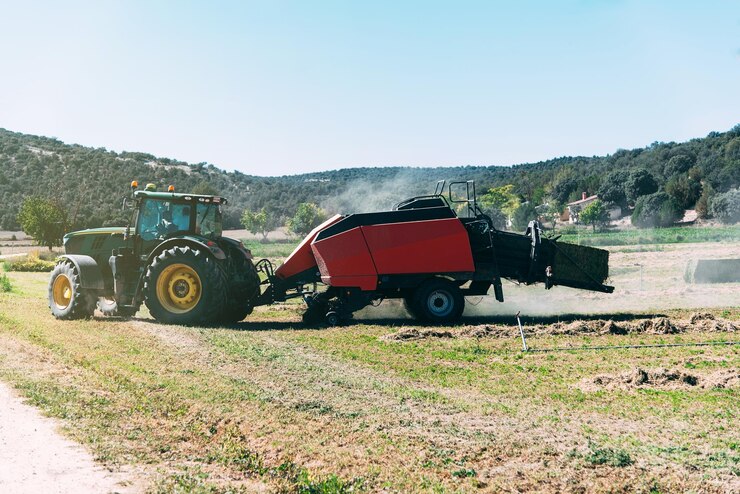Tractors have become indispensable in modern livestock farming, providing versatility and efficiency across various operations. From managing pastures to preparing feed, tractors play a critical role in ensuring the smooth functioning of livestock farms. By automating labor-intensive tasks and integrating advanced technology, tractors help farmers save time, reduce costs, and improve productivity. Here’s a closer look at their role in livestock farming and feed preparation.
1. Pasture Maintenance and Management
Healthy pastures are essential for livestock farming, especially for grazing animals such as cattle, sheep, and goats. Tractors equipped with mowers, rakes, and aerators help maintain pastures by:
- Cutting grass to the right height for optimal regrowth and grazing.
- Collecting cut grass or hay using rakes and tedders for feed storage.
- Aerating the soil to improve water penetration and nutrient absorption, ensuring a healthy pasture for livestock.
Regular maintenance using tractors ensures that grazing areas remain lush, nutritious, and sustainable.
2. Transporting Feed and Supplies
Tractors equipped with trailers or loaders are invaluable for transporting feed, bedding materials, and other supplies across the farm. Whether moving heavy bales of hay or delivering silage to feeding areas, tractors make these tasks faster and less labor-intensive. Their versatility allows farmers to navigate challenging terrain, ensuring livestock receives what they need, regardless of the farm’s size or location.
3. Harvesting and Storing Feed Crops
For livestock farms that grow their own feed, tractors are critical in the harvesting and storage process. Attachments such as forage harvesters and balers enable efficient cutting, collecting, and baling of crops like alfalfa, clover, and maize. Tractors also play a key role in transporting harvested feed to storage facilities, where it can be preserved for future use. Properly harvested and stored feed ensures livestock nutrition throughout the year, especially during dry or non-growing seasons.
4. Mixing and Distributing Feed
The preparation of balanced feed is a crucial part of livestock farming, particularly for dairy and poultry farms. Tractors equipped with feed mixer wagons allow farmers to create customized rations by blending different ingredients such as silage, grains, and supplements. Once the feed is prepared, tractors distribute it evenly across feeding stations, ensuring livestock receive consistent and adequate nutrition.
5. Waste Management
Managing manure and farm waste is essential for maintaining hygiene and preventing disease in livestock farming. Tractors equipped with manure spreaders efficiently collect and distribute manure across fields, turning waste into valuable organic fertilizer. This process not only supports sustainable farming practices but also improves soil fertility and reduces disposal challenges.
6. Fencing and Infrastructure Maintenance
Fencing and infrastructure are critical for livestock farming to keep animals secure and manage grazing areas effectively. Tractors equipped with post-hole diggers and hydraulic loaders simplify the construction and maintenance of fences, shelters, and other farm structures. This ensures that livestock are safe and have access to adequate housing and grazing areas.
7. Watering Systems Installation and Maintenance
Providing a reliable water supply for livestock is essential for their health and productivity. Tractors assist in installing and maintaining water storage systems, pipelines, and troughs. They are particularly helpful when working in large or remote areas of the farm, ensuring all animals have access to clean water.
8. Enhancing Productivity and Reducing Labor
By mechanizing time-consuming tasks, tractors free up valuable labor hours, allowing farmers to focus on other aspects of farm management. This efficiency is especially important in large-scale livestock operations, where manually completing tasks like feed distribution or pasture maintenance would require significant manpower.
9. Adapting to Modern Technology
Modern tractors are equipped with advanced features such as GPS, auto-steering, and data collection systems. These technologies enable precision farming, allowing farmers to monitor pasture health, optimize feed preparation, and track overall farm performance. Tractors integrated with smart farming tools help livestock farmers make informed decisions and improve their operations’ profitability and sustainability.
10. Supporting Diverse Livestock Operations
From dairy farms to poultry and pig farms, tractors cater to diverse needs. For instance, in dairy farming, tractors assist in handling silage and cleaning milking parlors. In poultry and pig farming, they are used to transport feed and bedding materials efficiently. Their adaptability makes them an essential asset across all types of livestock operations.
Tractors are a cornerstone of modern livestock farming, providing the power, efficiency, and versatility needed to manage daily operations effectively. From maintaining pastures to preparing and distributing feed, tractors streamline critical tasks, helping farmers save time and resources. With advancements in technology, tractors continue to play an ever-expanding role in improving productivity and sustainability in livestock farming. For farmers looking to grow their operations, investing in the right tractor and attachments is a decision that pays dividends in the long run.
Join 'Farmers Mag' WhatsApp Channel
Get the latest Farming news and tips delivered straight to your WhatsApp
CLICK HERE TO JOIN






